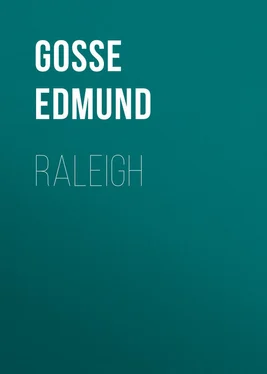Edmund Gosse - Raleigh
Здесь есть возможность читать онлайн «Edmund Gosse - Raleigh» — ознакомительный отрывок электронной книги совершенно бесплатно, а после прочтения отрывка купить полную версию. В некоторых случаях можно слушать аудио, скачать через торрент в формате fb2 и присутствует краткое содержание. Жанр: foreign_antique, foreign_prose, на английском языке. Описание произведения, (предисловие) а так же отзывы посетителей доступны на портале библиотеки ЛибКат.
- Название:Raleigh
- Автор:
- Жанр:
- Год:неизвестен
- ISBN:нет данных
- Рейтинг книги:3 / 5. Голосов: 1
-
Избранное:Добавить в избранное
- Отзывы:
-
Ваша оценка:
- 60
- 1
- 2
- 3
- 4
- 5
Raleigh: краткое содержание, описание и аннотация
Предлагаем к чтению аннотацию, описание, краткое содержание или предисловие (зависит от того, что написал сам автор книги «Raleigh»). Если вы не нашли необходимую информацию о книге — напишите в комментариях, мы постараемся отыскать её.
Raleigh — читать онлайн ознакомительный отрывок
Ниже представлен текст книги, разбитый по страницам. Система сохранения места последней прочитанной страницы, позволяет с удобством читать онлайн бесплатно книгу «Raleigh», без необходимости каждый раз заново искать на чём Вы остановились. Поставьте закладку, и сможете в любой момент перейти на страницу, на которой закончили чтение.
Интервал:
Закладка:
The existing documents which illustrate Raleigh's life in Ireland during 1581, and they are somewhat numerous, give the student a much higher notion of his brilliant aptitude for business and of his active courage than of his amiability. His vivacity and ingenuity were sources of irritation to him, as the vigour of an active man may vex him in wading across loose sands. There was no stability and apparently no hope or aim in the policy of the English leaders, and Raleigh showed no mock-modesty in his criticism of that policy. Ormond had been on friendly terms with him, but as early as February 25 a quarrel was ready to break out. Ormond wished to hold Barry Court, which was the key to the important road between Cork and Youghal, as his own; while Raleigh was no less clamorous in claiming it. In the summer, not satisfied with complaining of Ormond to Grey, he denounced Grey to Leicester. In the meantime he had succeeded in ousting Ormond, who was recalled to England, and in getting himself made, if not nominally, practically Governor of Munster. He proceeded to Lismore, then the English capital of the province, and made that town the centre of those incessant sallies and forays which Hooker describes. One of these skirmishes, closing in the defeat of Lord Barry at Cleve, showed consummate military ability, and deserves almost to rank as a battle.
In August, Raleigh's temporary governorship of Munster ended. He was too young and too little known a man permanently to hold such a post. Zouch took his place at Lismore, and Raleigh, returning to Cork, was made Governor of that city. It was at this time, or possibly a little earlier in the year, that Raleigh made his romantic attack upon Castle Bally-in-Harsh, the seat of Lord Roche. On the very same evening that Raleigh received a hint from head-quarters that the capture of this strongly fortified place was desirable, he set out with ninety men on the adventure. His troop arrived at Harsh very early in the morning, but not so early but that the townspeople, to the number of five hundred, had collected to oppose his little force. He soon put them to flight, and then, by a nimble trick, contrived to enter the castle itself, to seize Lord and Lady Roche at their breakfast-table, to slip out with them and through the town unmolested, and to regain Cork next day with the loss of only a single man. The whole affair was a piece of military sleight of hand, brilliantly designed, incomparably well carried out. The summer and autumn were passed in scouring the woods and ravines of Munster from Tipperary to Kilkenny. Miserable work he found it, and glad he must have been when a summons from London put an end to his military service in Ireland. In two years he had won a great reputation. Elizabeth, it may well be, desired to see him, and talk with him on what he called 'the business of this lost land.' In December 1581 he returned to England.
One point more may be mentioned. In a letter dated May 1, 1581, Raleigh offers to rebuild the ruined fortress of Barry Court at his own expense. This shows that he must by this time have come into a certain amount of property, for his Irish pay as a captain was, he says, so poor that but for honour he 'would disdain it as much as to keep sheep.' This fact disposes of the notion that Raleigh arrived at the Court of Elizabeth in the guise of a handsome penniless adventurer. Perhaps he had by this time inherited his share of the paternal estates. 2 2 Dr. Brushfield has found no mention of the elder Walter Raleigh later than April 11, 1578. As he was born in 1497, he must then have been over eighty years of age.
CHAPTER II.
AT COURT
Raleigh had not completed his thirtieth year when he became a recognised courtier. We have seen that he had passed, four years before, within the precincts of the Court, but we do not know whether the Queen had noticed him or not. In the summer of 1581 he had written thus to Leicester from Lismore: —
I may not forget continually to put your Honour in mind of my affection unto your Lordship, having to the world both professed and protested the same. Your Honour, having no use of such poor followers, hath utterly forgotten me. Notwithstanding, if your Lordship shall please to think me yours, as I am, I will be found as ready, and dare do as much in your service, as any man you may command; and do neither so much despair of myself but that I may be some way able to perform so much.
To Leicester, then, we may be sure, he went, – to find him, and the whole Court with him, in the throes of the Queen's latest and final matrimonial embroilment. Raleigh had a few weeks in which to admire the empty and hideous suitor whom France had sent over to claim Elizabeth's hand, and during this critical time it is possible that he enjoyed his personal introduction to the Queen. Walter Raleigh in the prime of his strength and beauty formed a curious contrast to poor Alençon, and the difference was one which Elizabeth would not fail to recognise. On February 1, 1582, he was paid the sum of 200 l. for his Irish services, and a week later he set out under Leicester, in company with Sir Philip Sidney, among the throng that conducted the French prince to the Netherlands.
When Elizabeth's 'poor frog,' as she called Alençon, had been duly led through the gorgeous pageant prepared in his honour at Antwerp, on February 17, the English lords and their train, glad to be free of their burden, passed to Flushing, and hastened home with as little ceremony as might be. Raleigh alone remained behind, to carry some special message of compliment from the Queen to the Prince of Orange. It is Raleigh himself, in his Invention of Shipping , who gives us this interesting information, and he goes on to say that when the Prince of Orange 'delivered me his letters to her Majesty, he prayed me to say to the Queen from him, Sub umbra alarum tuarum protegimur : for certainly, said he, they had withered in the bud, and sunk in the beginning of their navigation, had not her Majesty assisted them.' It would have been natural to entrust to Leicester such confidential utterances as these were a reply to. But Elizabeth was passing through a paroxysm of rage with Leicester at the moment. She ventured to call him 'traitor' and to accuse him of conspiring with the Prince of Orange. Notwithstanding this, his influence was still paramount with her, and it was characteristic of her shrewd petulance to confide in Leicester's protégé , although not in Leicester himself. Towards the end of March, Raleigh settled at the English Court.
On April 1, 1582, Elizabeth issued from Greenwich a strange and self-contradictory warrant with regard to service in Ireland, and the band of infantry hitherto commanded in that country by a certain Captain Annesley, now deceased. The words must be quoted verbatim: —
For that our pleasure is to have our servant Walter Rawley [this was the way in which the name was pronounced during Raleigh's lifetime] trained some time longer in that our realm [Ireland] for his better experience in martial affairs, and for the especial care which We have to do him good, in respect of his kindred that have served Us, some of them (as you know) near about Our person [probably Mrs. Catherine Ashley, who was Raleigh's aunt]; these are to require you that the leading of the said band may be committed to the said Rawley; and for that he is, for some considerations, by Us excused to stay here. Our pleasure is that the said band be, in the meantime, till he repair into that Our realm, delivered to some such as he shall depute to be his lieutenant there.
He is to be captain in Ireland, but not just yet, not till a too tender Queen can spare him. We find that he was paid his 'reckoning' for six months after the issue of this warrant, but there is no evidence that he was spared at any time during 1582 to relieve his Irish deputy. He was now, in fact, installed as first favourite in the still susceptible heart of the Virgin Star of the North.
Читать дальшеИнтервал:
Закладка:
Похожие книги на «Raleigh»
Представляем Вашему вниманию похожие книги на «Raleigh» списком для выбора. Мы отобрали схожую по названию и смыслу литературу в надежде предоставить читателям больше вариантов отыскать новые, интересные, ещё непрочитанные произведения.
Обсуждение, отзывы о книге «Raleigh» и просто собственные мнения читателей. Оставьте ваши комментарии, напишите, что Вы думаете о произведении, его смысле или главных героях. Укажите что конкретно понравилось, а что нет, и почему Вы так считаете.












